SB 1383 – California’s Organic Recycling Law
WHAT IS SB 1383?
SB 1383 is a statewide effort to reduce emissions of short-lived climate pollutants (SLCP). Specifically, the law sets the following targets:
- Reduce statewide disposal of organic waste by 50% by January 1, 2020 and by 75% by January 1, 2025 (based on 2014 levels).
- Rescue at least 20% of currently disposed of edible food for human consumption by 2025.
CalRecycle is the state agency responsible for creating the regulatory standards for SB 1383. The final regulations for SB 1383 can be found here.
- Effective January 1st, 2022: CalRecycle’s regulations to meet statewide organics reduction and food recovery requirements take effect. Enforcement provisions, including penalties for noncompliance issued by the state, also take effect.
- Effective January 1st, 2024: Regulations may require local jurisdictions to impose penalties for noncompliance on regulated entities subject to their authority.
WHY SB 1383?
When compostable materials such as food scraps and paper products break down in a landfill, they become powerful contributors to greenhouse gas emissions. Compostable materials such as food waste and paper decompose anaerobically (without oxygen) in a landfill, producing methane (CH4)—one of the most potent greenhouse gases in Earth’s atmosphere.
The intent of this organics diversion goal is to reduce these emissions in light of global climate change.
Did you know that 40 – 60% of waste landfilled is organic material? (organic in this case meaning coming from recently living organisms like plants or animals). Reducing organic waste by 75% from the 2014 base year would require diversion of about 292,000 tons per year. While this goal may seem big, each one of us has the power to help reach this goal.
WHO DOES SB 1383 APPLY TO?
SB 1383 applies to all residents (single-family homes and apartments/condos) and businesses.
How does it impact me as a resident?
All residents living in single-family homes in the Strawberry/Mill Valley Refuse area are automatically provided curbside organics (compost/green cart) service. If you do not have compost service, please contact Mill Valley Refuse Service to set it up.
How does it impact me as a business?
If you own a business or apartment/condo complex (of five units or more), you are required to:*
- Divert organic materials from the landfill by
- Subscribing to and participating in the organics collection service via Mill Valley Refuse, or
- Self-haul organic waste to a specified composting facility, community composting program, or other collection activity or program.
- Records must be maintained of this service for amount of materials delivered to each facility.
- Provide collection containers for organic waste and recyclables to employees, contractors, tenants, and customers
- Collection service must be arranged so that access to an adequate number, size, and location of containers with correct labels is available.
- Provide indoor containers for organic waste and recyclables in all areas where disposal containers are provided for customers, except in restrooms (multi-family dwellings are exempt).
- For all outdoor and indoor containers, the container bodies or lids shall conform to the following color scheme: gray/black for garbage, blue for recycling, and green for organics. In addition, containers shall have labels with graphic images to indicate primary materials accepted and prohibited. Mill Valley Refuse may be able to provide these containers and labels at no additional cost.
- Annually provide educational information about the legal requirements to compost and recycle including how to properly sort between the three waste streams. Strawberry Recreation District and Mill Valley Refuse Service can provide educational materials for your employees and apartment/condo residents.
For the recovery of edible food waste, edible food generators are split into two tiers and must arrange to recover the maximum amount of their edible food that would otherwise go to landfills and maintain records.
Tier One must comply with edible food recovery requirements by Jan. 1st, 2022. This includes:
- Supermarkets
- Grocery stores (with a total facility size ≥ 7,500 sq. ft.)
- Food service distributors
- Wholesale food markets
Tier Two must comply with edible food recovery requirements by Jan. 1st, 2024. This includes:
- Restaurants (with ≥ 250 seats, or ≥ 5,000 sq. ft.)
- Hotels (with onsite food facility and ≥200 rooms),
- Health facilities (with onsite food facility and ≥100 beds),
- State agencies (with a cafeteria with ≥ 250 seats, or ≥ 5,000 sq. ft)
- Local education agencies (with an onsite food facility)
- Large venues
- Large events
*Commercial businesses may be granted a waiver by a jurisdiction and thus exempted from some or all requirements if they can provide documentation and evidence to support one of the waiver options. More information about waivers can be reviewed on the CalRecycle Website.



